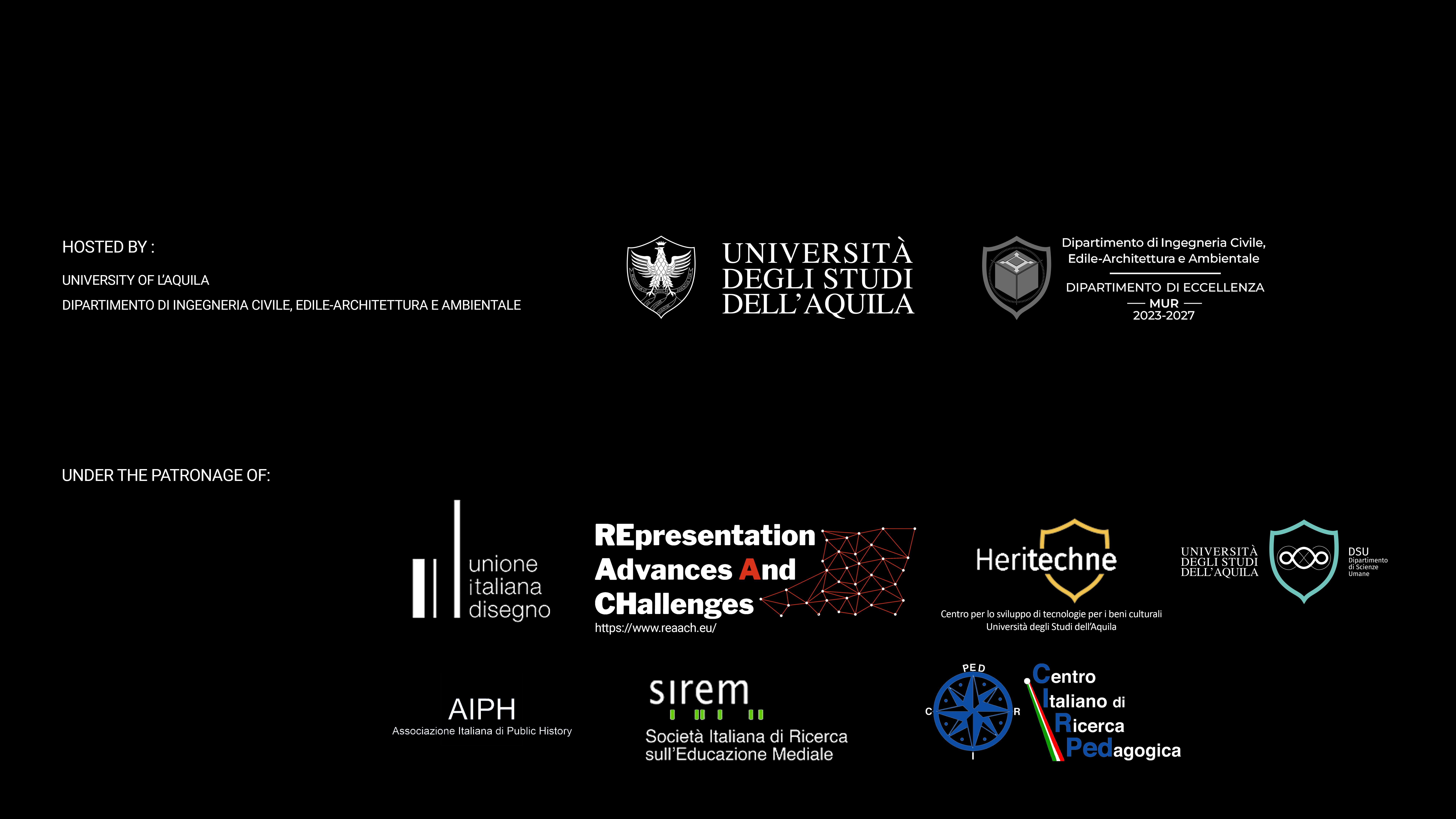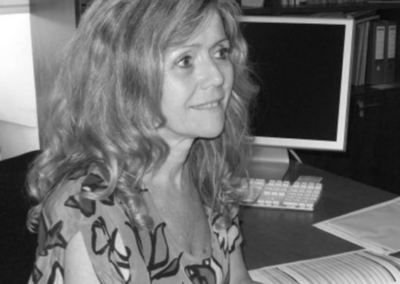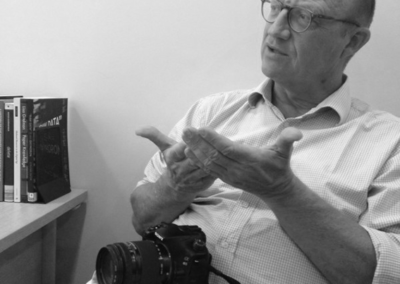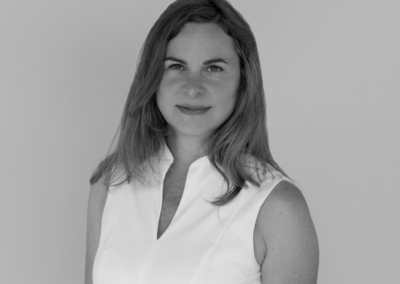

IMAGIN(G) HERITAGE
Since the 21st century, the studies and documents dedicated to heritage have increasingly highlighted the inescapable role played by populations, communities, inhabitants, users – and therefore also on the relationship between scholars and people – in the definition and conservation of heritage.
At the same time, the awareness of the importance of intangible dimensions of heritage has risen. It must be understood not in opposition to its physical manifestations – immanent witnesses of historical, aesthetic, cultural, use values, etc. – but to develop an inclusive, complex, and interconnected dialogue, where the ontological reality maintains a critical role in the multidirectional relationship with its epiphanies.
The concept of heritage takes on the nature of a “discourse”, that is an act of participatory communication, according to a path of “heritage making”, where the visual paradigm has a consubstantial role with the verbal one. This is also favoured by the practices introduced into everyday life by Digitality, and in this sense the ICT renews phenomena of “pictorial turn”.
Certainly, the notion of heritage originates from the passage through time of the asset, that is its being in time, and therefore the concepts of “history” and “memory” have an essential role, and they pose related questions regarding the visualisation of the present and the past.
In recent years there have been many conferences on technologies for cultural heritage survey and digitization, but this conference aims to focus on the visual dimension of the discourse on heritage: not “heritage imaging” but rather “imagin heritage” and “imaging heritage”, focusing attention on the role of physical and mental images of heritage, themselves heritage, which have as their object the heritage in any way intended.
It is a theme that embraces multiple fields, and the aim of the conference is to encourage co-disciplinary confrontation, exchange, and dialogue.
A partire dal XXI secolo, gli studi ed i documenti dedicati al patrimonio hanno sempre più messo in evidenza il ruolo svolto dalle popolazioni, comunità, dagi abitanti, utenti – e quindi al contempo anche dal rapporto tra studiosi e persone – nella definizione del patrimonio stesso.
Al contempo si è sviluppata la coscienza dell’importanza delle dimensioni intangibili dell’heritage, da intendersi non in opposizione alle sue manifestazioni fisiche – testimoni immanenti dei valori storici, estetici, culturali, d’uso, etc. – ma a sviluppare un dialogo inclusivo, complesso ed interconnesso, dove la realtà ontologica mantiene un ruolo critico nel rapporto multidirezionale con le sue epifanie.
Il concetto di heritage viene ad assumere la natura di un “discorso”, cioè un atto di comunicazione partecipativo, secondo un percorso di “heritage making”, dove il paradigma visivo ha un ruolo consustanziale a quello verbale. Questo è anche favorito dalle pratiche introdotte nella quotidianità dalla Digitalità, ed in tal senso le ICT rinnovano fenomeni di “pictorial turn”.
Certamente la nozione di heritage trae origine dal passaggio nel tempo del bene, cioè il suo essere nel tempo, e pertanto giocano un ruolo essenziale i concetti di “storia” e di “memoria”, che pongono relative questioni in merito alla visualizzazione del presente e del passato.
Negli ultimi anni si sono succeduti molti convegni incentrati sulle tecnologie per il rilievo e la digitalizzazione dei beni culturali; piuttosto questo convegno vuole porre l’attenzione sulla dimensione visuale del discorso sul patrimonio: non “heritage imaging” quanto piuttosto “immagina il patrimonio” / “un patrimonio di immagini”, focalizzando l’attenzione sul ruolo delle immagini fisiche e mentali dell’heritage, e pertanto sul patrimonio di immagini, esse stesse heritage, che hanno per oggetto i beni comunque intesi.
Si tratta di una tematica che abbraccia molteplici campi, ed obiettivo del convegno è favorire un confronto, scambio e dialogo co-disciplinare.
TOPICS
The main topics are (but not limited to):
Visual Heritage
Heritage Graphical Studies
Participatory Heritage
Heritage Education
Public Heritage
Public History
Heritage Interpretation and Presentation
Heritage Visual Storytelling
Heritage & Museum
Heritage & Archive
Digital Heritage
Heritage Extended Reality
Phygital Heritage
IMG2023 BEST PAPER AWARDS
|
Dario Ambrosini, Annamaria Ciccozzi, Tullio De Rubeis, Domenica Paoletti, Optical methods: imagin(g) the hidden world of cultural heritage Battini Carlo, Tecnologie di rilevamento no contact: anche espressione artistica? Alessandra De Nicola, Franca Zuccoli, Fruizione e interpretazione del patrimonio. Un percorso di costruzioni di kit: l’importanza delle immagini Margherita Fontana, A proposal for a bunker aesthetics from Paul Virilio’s archaeology to virtual architecture
|
HOW TO PARTICIPATE
PAPER SUBMISSION
Accepted languages: English, Italian, Spanish, German, Portuguese, French.
The paper has to contain:
. Title and subtitle (in the chosen language and in English)
. Name(s) of author(s), affiliation(s), email(s)
. Short Abstract (in the chosen language and in English, max. 500 characters, spaces included)
. Keywords (in the chosen language and in English, max. 5)
. Text (in the chosen language, max 15.000 characters, spaces and references included)
. References
. Cover figure: 1 image for the paper cover (300 dpi, maximum width 14 cm)
. Paper figures: max 3 images (300 dpi, maximum width 9 cm)
. Captions (one for each figure, inserted where the figure should be placed). If necessary, cite the image source and publishing permission.
Prepare the paper according to the “Authors Guidelines”
The paper must be sent by mail to the address: img2023@img-network.it.
Please send all materials related to the paper in a compressed folder named “surname-name.zip”.
Authors have to send the following files:
– A word file with the texts (.doc or .docx file, with the following file name: “surname-name_text.doc” – example: “rossi-mario_text.doc”). Insert in the file the figures with captions, and the references.
– A pdf file without the name of the author(s) and any identifying information for the blind peer review, with the following file name: “surname-name_review.pdf” .
– The figures (.jpg files, with the following file name: “surname-name_cover.jpg”; “surname-name_image1. jpg”; “surname-name_image2. jpg”; etc.)
The papers will be published by Publica Press (https://www.publicapress.it/) in an ISBN book of proceedings, under a Creative Commons Attribution-NonCommercial-NoDerivatives Licence 4.0 International (CC BY-NC-ND 4.0).
Authors of selected papers will be invited to submit an English extended version of the paper for an international publication.
![]() DOWNLOAD THE AUTHORS GUIDELINES
DOWNLOAD THE AUTHORS GUIDELINES
KEY DATES
January 1: Opening call for papers
(NEW) March 13: Deadline paper submission
April 3: Paper acceptance
May 2: Deadline early registration
May 22: Preliminary Program
July 6-7: Conference and Proceeding Publication
COMMITTEES
SCIENTIFIC COMMITTEE
Dario Ambrosini
Università degli Studi dell’Aquila, IT
Fabrizio Apollonio
Alma Mater Studiorum Università di Bologna, IT
Demis Basso
Free University of Bozen-Bolzano, IT
Paolo Belardi
Università degli Studi di Perugia, IT
András Benedek
Budapest University of Technology and Economics, H
Emma Beseghi
Alma Mater Studiorum Università di Bologna, IT
Giorgio Camuffo
Free university of Bozen-Bolzano, IT
Mario Centofanti
Università degli Studi dell’Aquila, IT
Eugene Ch’ng
University of Nottingham, GB
Pilar Chías Navarro
Universidad de Alcalá, E
Enrico Cicalò
Università degli Studi di Sassari, IT
Alessandra Cirafici
Università degli Studi della Campania “Luigi Vanvitelli”, IT
Simonetta Ciranna
Università degli Studi dell’Aquila, IT
Cristina Collettini Soprintendete Archeologia Belle Arti e Paesaggio Abruzzo, IT
Roberto Dainese
Alma Mater Studiorum Università di Bologna, IT
Marco Antonio D’Arcangeli
Università degli Studi dell’Aquila, IT
Manuel de Miguel
Universidad de Alcalá, E
Agostino de Rosa
Università Iuav di Venezia, IT
Antonella Di Luggo
Università degli Studi di Napoli Federico II, IT
Paolo Di Stefano
Università degli Studi dell’Aquila, IT
Edoardo Dotto
Università degli Studi di Catania, IT
Francesca Fatta
Università degli Studi Mediterranea di Reggio Calabria, IT
Maria Linda Falcidieno
Università degli Studi di Genova, IT
Roberto Farnè
Alma Mater Studiorum Università di Bologna, IT
Franz Fischnaller
Accademia Albertina di Belle Arti di Torino, IT
Marco Gaiani
Alma Mater Studiorum Università di Bologna, IT
Fabrizio Gay
Università Iuav di Venezia, IT
Teresa Gil-Piqueras Universitat Politècnica de València
Andrea Giordano
Università degli Studi di Padova, IT
Nicole Goetschi Danesi
Haute Ecole Pédagogique, CH
William Grandi
Alma Mater Studiorum Università di Bologna, IT
Fabio Graziosi
Università degli Studi dell’Aquila, IT
Nicolás Gutierrez
University of Jaén, E
Robert Harland
Mississipi State University, USA
Ricard Huerta
University of Valencia, E
Elena Ippoliti
Sapienza Università di Roma, IT
Maria Vittoria Isidori
Università degli Studi dell’Aquila, IT
Pedro António Janeiro
Università di Lisbona, P
Massimiliano Lo Turco
Politecnico di Torino, IT
Alessandro Luigini
Free University of Bozen-Bolzano, IT
Francesco Maggio
Università degli Studi di Palermo, IT
Stuart Medley
Edith Cowan University, AUS
Valeria Menchetelli
Università degli Studi di Perugia, IT
Matteo Moretti
University of the Republic of San Marino, RSM
Raffaele Milani
Alma Mater Studiorum Università di Bologna, IT
Henry Muccini
Università degli Studi dell’Aquila, IT
Elena Pacetti
Alma Mater Studiorum Università di Bologna, IT
Chiara Panciroli
Alma Mater Studiorum Università di Bologna, IT
Cristiana Pasqualetti
Università degli Studi dell’Aquila, IT
Luca Pezzuto
Università degli Studi dell’Aquila, IT
Andrea Pinotti
Università degli Studi di Milano, IT
Antonella Poce
Università degli Studi di Roma Tre, IT
Paola Puma
Università degli Studi di Firenze, IT
Fabio Quici
Sapienza Università di Roma, IT
Ana Margarida Ramos
University of Aveiro, P
Michael Renner
The Basel School of Design, CH
Pier Cesare Rivoltella
Università Cattolica del Sacro Cuore di Milano, IT
Pablo Rodríguez-Navarro Universitat Politècnica de València
Daniele Rossi
Università degli Studi di Camerino , IT
Pier Giuseppe Rossi
Università degli Studi di Macerata, IT
Rossella Salerno
Politecnico di Milano, IT
Maurizio Unali
Università degli Studi “G. d’Annunzio” di Chieti-Pescara, IT
Tomaso Vecchi
Università degli Studi di Pavia, IT
Daniele Villa
Politecnico di Milano, IT
Carlo Vinti
Università degli Studi di Camerino, IT
Ornella Zerlenga
Università degli Studi della Campania “Luigi Vanvitelli”, IT
Federica Zalabra
Direttore del Museo Nazionale d’Abruzzo, IT
Franca Zuccoli
Università di Milano Bicocca, IT
PROGRAM AND ORGANIZING COMMITTEE
Stefano Brusaporci [c]
Alfonso Forgione
Pamela Maiezza
Adriana Marra
Silvia Mantini
Antonella Nuzzaci
Ilaria Trizio
Alessandra Tata
Francesca Savini
Luca Vespasiano
REGISTRATION & FEE
Early registration
Late registration
by May 2, 2023
after May 2, 2023
Regular registration
200€
250€
Scientific committee
160€
200€
ERC
100€
180€
Social Dinner (06/07)
50€
60€
(bookable before June 30)
REGISTRATION
Participants have to:
1 – pay via bank transfer or PAYPAL in favor of:
Associazione IMG NETWORK APS
Reason for payment:
“IMG23 Name and Surname of the participant”
Sparkasse
IBAN: IT90I0604511700000005003897
BIC: CRBZIT2B096
2 – fill in the >REGISTRATION FORM< and upload the payment receipt
The fee includes:
1) the membership to the IMG-Network APS Association,
2) the conference kit, lunches, coffee breaks.
Location, organization, fee and registration procedures for the social dinner will be communicated by the end of May.
The reduced fee is intended for Early Career Researchers (ERC) – undergraduate students, PhD students, research fellows – and for the members of the Scientific Committee
The payment of at least one author’s fee is required for each accepted paper.
REGISTRAZIONE
I partecipanti dovranno:
1 – eseguire il pagamento tramite bonifico bancario o PAYPAL in favore di:
Associazione IMG NETWORK APS
Causale:
“IMG23 Nome e Cognome del partecipante”
Sparkasse
IBAN: IT90I0604511700000005003897
BIC: CRBZIT2B096
2 – compilare il >FORM DI REGISTRAZIONE< caricando la ricevuta di pagamento
La quota comprende:
1) l’iscrizione all’Associazione IMG-Network APS
2) il conference kit, pranzi, coffee break
Location, organizzazione, quota e modalità di iscrizione alla cena sociale verranno comunicate entro fine maggio.
Le quote ridotte sono previste per gli Early Career Researchers (ERC) – studenti, dottorandi, assegnisti di ricerca – e per i membri del Comitato Scientifico
E’ richiesto il pagamento di almeno una quota di iscrizione per ogni paper accettato.
VENUE & TRAVEL
Arriving in L’ Aquila
BY TRAIN AND BUS:
Arrive at the Tiburtina train station in Rome (https://www.rfi.it/it/stazioni/roma-tiburtina.html);
From the bus station near the Tiburtina train station (https://www.tibusroma.it/), there is a bus to L’Aquila about every hour and a half.
Recommended bus stops in L’Aquila near the convention center (https://www.tuabruzzo.it/): bus stop “QUESTURA”, bus stop “VIALE DELLA CROCE ROSSA” (zona Valle Pretara), BIVIO VIA MONTE CAMICIA-VIALE OVIDIO”, bus stop Terminal di COLLEMAGGIO (Capolinea)
BY AIRPLAIN AND BUS:
The following bus companies directly connect Rome Ciampino and Fiumicino Airports to L’Aquila (in L’Aquila the bus stop is near the so called “Hotel Amiternum”): Itabus (https://www.itabus.it/); FlixBus (https://www.flixbus.it/); Roma Linee (https://www.stefanomignani.it/); Gaspari Bus (https://www.gasparionline.it/).
BY CAR:
Highway A24
Staying in L’ Aquila
In L’Aquila there are several hotels and many bed and breakfasts and apartments for rent that can be booked through booking.com and airbnb.com.
Follows some recommended hotels:
Hotel San Michele (https://www.stmichelehotel.it/)
Hotel Federico II (https://www.hotelfedericosecondo.it/)
Hotel L’Aquila (https://www.hotel-laquila.com/)
Hotel Novantanove Cannelle (https://hotel99cannelle.it/)
My Suite Hotel (https://www.mysuitehotel.it/)
Magione Papale Relais (https://www.magionepapale.it/)
CONTACTS
LOCATION
University of L’Aquila
Piazza San Basilio
L’Aquila (IT)




